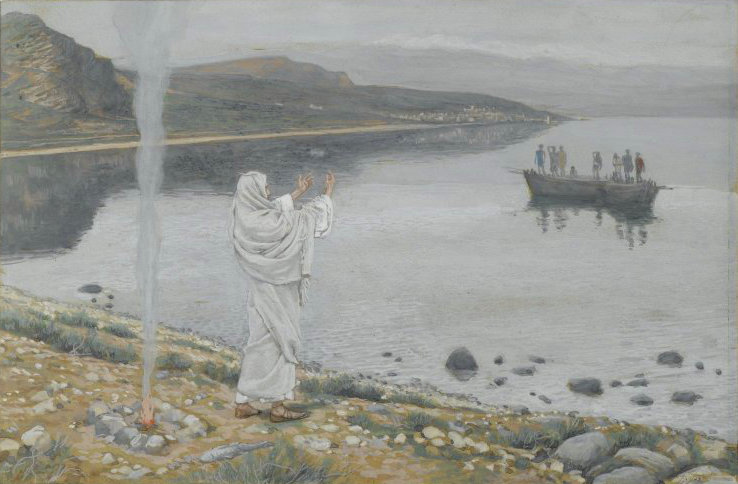Beating the Devil Down in Georgia: On Reading Deeper Waters by Nibs Stroupe
 |
| Christ Appears on the Shore of Lake TiberiasBy James Tissot [Public domain], via Wikimedia Commons |
I've never met Rev. Stroupe, though while enrolled at the Candler School of Theology in the mid 90s, I did encounter parishioners from the multi-racial and economically diverse Oakhurst Presbyterian Church (PCUSA) in Decatur that he co-pastored with his wife, Caroline Leach, for 34 years. I regret I never visited this remarkable congregation for myself, a community that has striven to embody Martin Luther King Jr.'s vision of a radically inclusive, beloved community.
Deeper Waters: Sermons for a New Vision, By Nibs Stroupe (edited by Collin Cornell) (Eugene, OR: Wipf & Stock, 2017).
During this Lent I've been ruminating on this superb volume of Stroupe's sermons, ably edited and introduced by friend-of-the blog Collin Cornell, a doctoral student in biblical studies at Emory University. In an age when the President of the United States jokes about nuclear war, derides women and immigrants, and openly flouts the rule of law, people of faith need to publish and read more books like this one. (The publisher sent me a complimentary copy, without any expectation of a positive review.)
For Black History Month each year, Stroupe offered a sermon series lifting up the life-stories of African American activists. Reading one such sermon, I learned about Diane Nash, the Nashville-based Civil Rights leader, whose tenacity keep the 1961 Freedom Rides going while Attorney General Robert Kennedy and others worked behind-the-scenes to protect (as as they saw it) the safety of the riders by cooling down the movement for a bit. Nash would have none of it, and she made arrangements to have cars bringing activists, including John Lewis, from the Tennessee line back into Birmingham, where they had been turned away and where they would face more violence from Sheriff Bull Connor's police force. Nash, Stroupe writes, "heard her name called" and fulfilled prophecy of Habakkuk: "she wrote the vision and made it plain, the righteous shall live by faith" (p. 83).
Stroupe's work can help us develop more biblically informed ways of analyzing racism and other social ills theologically.
Take, for instance, the notion of the uncannily demonic, trans-personal autonomy the principalities exhibit. In his introduction, Cornell highlights the ways in which Stroupe struggles to understand how otherwise decent and upright individuals -- mothers, fathers, co-workers, churchgoers -- find even their best personal intentions beset and overruled, within and without, by oppressive structures whose cumulative effect exceeds the scope of individual agency. Stroupe compares the effect of these person-deforming forces to the worm that burrow deeply into an ear of corn, rotting it from within. Cornell writes:
Stroupe insists throughout his preaching that the control of destructive powers like racism or misogyny or homophobia or violence is so complete that they have even hijacked our self-definition. There is no us left that does not answer to their intentions and demands; no way of being white that is not already caught up in exploiting and destroying black and brown humans (p. xv).
So exhaustive is the effect of these powers, that when I attempt to utter my own name, I speak their names instead. Legion they may be, but their common ministration is an exaltation of the power of death. But, thanks be to God, this is not the last word spoken:
Our captivity to death is nowhere clearer and bolder than in Jesus' death on the cross. There we see the full extent of our bondage to the powers of evil (p. xvi)
Nonetheless, Cornell continues:
the impossible abundance and tenacity of God's love is shown in this: that God called Jesus out of the grave (ibid.).
For Stroupe (and Stringfellow), the power of Christ's resurrection is not mere a past-tense affair. How can these things be? Maybe we'll get a better sense of things on the other side of Good Friday.
==================================
Follow @jsjackson15



Comments